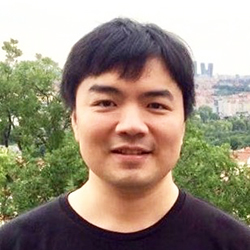Top Qs
Timeline
Chat
Perspective
Jian Ma (computational biologist)
American computer scientist From Wikipedia, the free encyclopedia
Remove ads
Jian Ma (Chinese: 马坚) is an American computer scientist and computational biologist.[1] He is the Ray and Stephanie Lane Professor of Computational Biology in the School of Computer Science at Carnegie Mellon University.[2][3][4] He is a faculty member in the Ray and Stephanie Lane Computational Biology Department.
His lab develops AI/ML methods to study the structure and function of the human genome[5] and cellular organization and their implications for health and disease. During his Ph.D. and postdoc training, he developed algorithms to reconstruct the ancestral mammalian genome and evolutionary history.[6] His research group has recently pioneered a series of new machine learning solutions for 3D genome organization, single-cell epigenomics, spatial omics, and complex molecular interactions. His lab also explores large language models to uncover gene regulatory mechanisms and the intricate connections among cellular components, with the aim of driving discovery and guiding experimentation.
He received an NSF CAREER award in 2011.[7] In 2020, he was awarded a Guggenheim Fellowship[8][9][10] in Computer Science. He received the Allen Newell Award for Research Excellence (2025). He is an elected Fellow of the American Association for the Advancement of Science,[11] the American Institute for Medical and Biological Engineering,[12] and the International Society for Computational Biology.[13]
He leads an NIH 4D Nucleome Center to develop machine learning algorithms to better understand the cell nucleus.[5][14] He served as the Program Chair for RECOMB 2024.[15] He is also a member of the Scientific Advisory Broad of the Chan Zuckerberg Biohub Chicago (CZ Biohub Chicago)[16] and the RECOMB Steering Committee.[17]
In 2024, he launched the Center for AI-Driven Biomedical Research (AI4BIO) at CMU, which will be a catalyst for innovations at the intersection of AI and biomedicine across the School of Computer Science and campus.[18][19]
Remove ads
Selected Recent Publications
- Chen V#, Yang M#, Cui W, Kim JS, Talwalkar A*, and Ma J*. Applying interpretable machine learning in computational biology - pitfalls, recommendations and opportunities for new developments. Nature Methods, 21(8):1454-1461, 2024.
- Xiong K#, Zhang R#, and Ma J. scGHOST: Identifying single-cell 3D genome subcompartments. Nature Methods, 21(5):814-822, 2024.
- Zhou T, Zhang R, Jia D, Doty RT, Munday AD, Gao D, Xin L, Abkowitz JL, Duan Z*, and Ma J*. GAGE-seq concurrently profiles multiscale 3D genome organization and gene expression in single cells. Nature Genetics, 56(8):1701-1711, 2024.
- Zhang Y, Boninsegna L, Yang M, Misteli T, Alber F, and Ma J. Computational methods for analysing multiscale 3D genome organization. Nature Reviews Genetics, 5(2):123-141, 2024.
- Chidester B#, Zhou T#, Alam S, and Ma J. SPICEMIX enables integrative single-cell spatial modeling of cell identity. Nature Genetics, 55(1):78-88, 2023. [Cover Article]
- Zhang R#, Zhou T#, and Ma J. Ultrafast and interpretable single-cell 3D genome analysis with Fast-Higashi. Cell Systems, 13(10):P798-807.E6, 2022. [Cover Article]
- Zhu X#, Zhang Y#, Wang Y, Tian D, Belmont AS, Swedlow JR, and Ma J. Nucleome Browser: An integrative and multimodal data navigation platform for 4D Nucleome. Nature Methods, 19(8):911-913, 2022.
- Zhang R, Zhou T, and Ma J. Multiscale and integrative single-cell Hi-C analysis with Higashi. Nature Biotechnology, 40:254–261, 2022.
Remove ads
References
External links
Wikiwand - on
Seamless Wikipedia browsing. On steroids.
Remove ads

